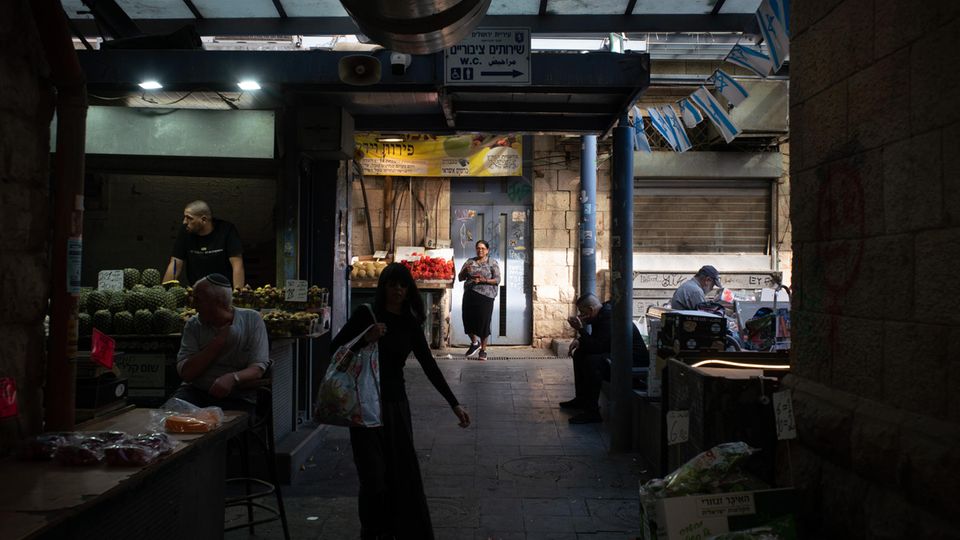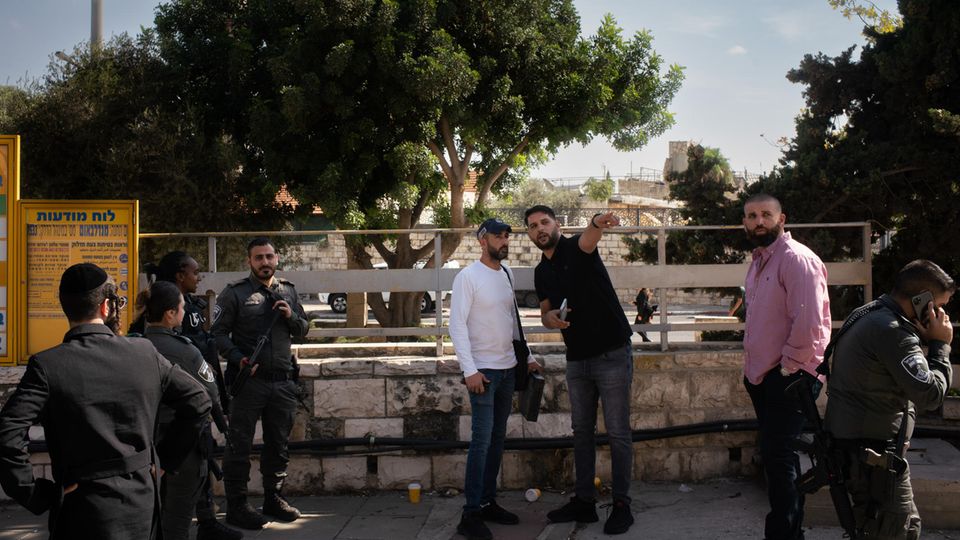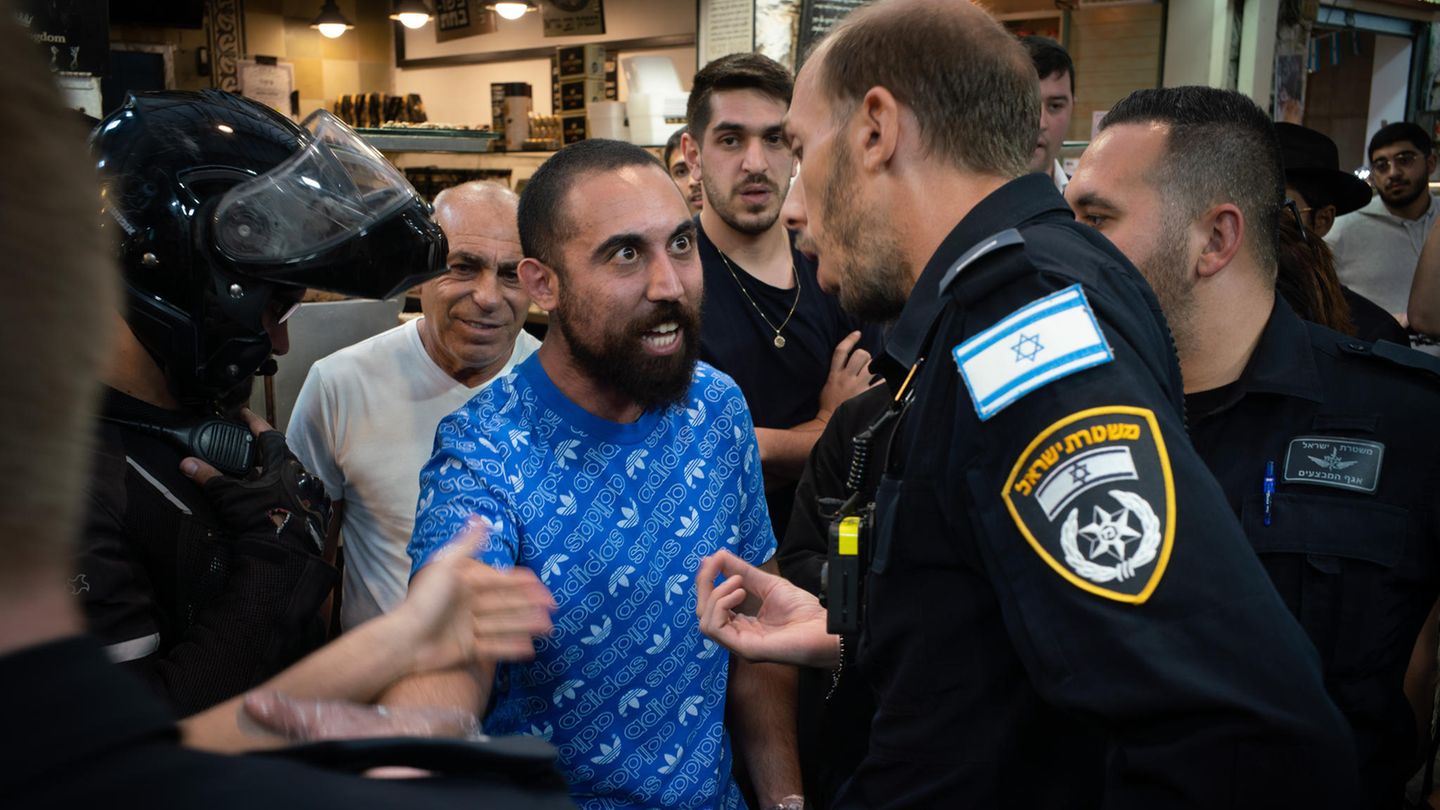The Palestinian and Jewish worlds meet hard in Jerusalem. The mood reflects the war in Gaza – and could escalate at any time.
Suddenly they run. And when someone runs in Jerusalem, it rarely means anything good. A man with an Adidas T-shirt and black hair in front, five police officers behind him, two on horses. They rush through the middle of the Yehuda Market in Jerusalem between stalls of Arab and Jewish traders, their rifles slung over their shoulders.
The pursued man in the front turns and shouts at them. A few minutes earlier he had caused a small commotion at a sweets market stall and had insulted other men there – now he is to be escorted from the market. But he does not want to. He throws swear words around, the police talk to him and want to see his ID. He doesn’t want that either.
Jerusalem is seething these days; any argument can turn into a scuffle in which a knife is suddenly pulled out or a bullet is fired. In the city that Israel claims as its “eternal and indivisible capital” and whose eastern part Palestinians see as the capital of their independent state, the anger that currently holds the country in its grip is visible as if under a magnifying glass.
The anger of Jewish Israelis at the Arabs, whom many of them see as supporters of the terrorists who want to wipe Israel off the map.
And the anger of many Arab residents of Israel who find themselves exposed to arbitrary violence – and who fear for their families and friends in bombed Gaza.

At Yehuda Market in Jerusalem, less than half of the stalls are open. Many people are staying at home because of the violence that threatens to break out at any minute. Fans under the tin roofs drown out the otherwise loud calls of the market crier, which today are only sporadic: bananas for 20 shekels, bags of sweets for ten.
Many of the closed stalls belong to Arabs who don’t dare to work these days, says a seller. But also Jewish sellers who are afraid of escalations. “Actually, in the Yehuda market it doesn’t matter who you are: Arab, Jew,” says Khalil, 32, black shirt and cropped hair. He laughs and kisses his colleague, who is wearing a yarmulke, and calls out “Eyyy, Moshe!” He grins back. “We’re not talking about politics here. But now you don’t know whether there will be chaos soon…” He goes back to the stand, one of the few customers wants to be served.
Many here speak of impending chaos, or Balagan, as it is called here in Hebrew.
Just that morning, a Palestinian stabbed a soldier at a train stop in Jerusalem, then ran to a gas station to find more victims and was finally shot by soldiers.
Police and emergency vehicles are at the scene, the blood has already been washed off the asphalt with water. The police question the operator of the gas station. There is an office next door where Arab Israelis also work. The soldiers ask a boy to delete the video of the incident from his cell phone; such videos should not be distributed.

A 24-year-old who works in the same office saw everything and said: “I only heard the man scream when he ran to the gas station. And then soldiers, 15 or so, came and shot him.” She hid behind desks with her colleagues during the shooting.
If you talk to the young woman for a while – she doesn’t want her name published – one thing becomes clear. She does not condemn attacks like the one on the soldier. She does not see herself as an Arab Israeli, but as a Palestinian. “The man at the gas station earlier knew he was going to be shot. He wanted to liberate Palestine.”
She says that many young Palestinian men, like – she suspects – the attacker, are currently desperate. Especially, she says, since you can see how people in Gaza are being killed and there’s nothing you can do about it. She tells how soldiers regularly check her passport and cell phone and how she doesn’t even write messages about Gaza or deletes them afterwards so that she doesn’t come under suspicion at the next check.
“This should be Palestine again,” she says.
And where should the Jewish Israelis go then?
“Gone,” she says, but doesn’t want to elaborate. She has no Jewish friends or acquaintances.
If you ask them about the massacre on October 7th that Hamas carried out in Israel on children, women and men near Gaza and whose horrors the terrorists themselves even recorded on video – beheadings, rapes, mutilations – then the answer is: that is Israeli propaganda. Hamas never killed babies and children. She doesn’t believe that body discoveries and photographs prove the opposite.
She generally sees the attack as an act of liberation. What did she and those around her think when they heard about the attack? “We were a little happy.”
Opinions like yours are among the most radical these days – but they reflect how some Arabs in Israel are currently viewing the situation. But also how the empathy of both Arab and Jewish-Israeli people stops at the borders of their own community. It’s us or them.
Peace activist Aziz Abu Sarah has been working against this camp mentality for years. He lives in East Jerusalem star However, during the current situation, you can reach him on the phone in the USA. Abu Sarah founded the travel company “Mejdi tours” with Jewish and Arab friends. They now organize internationally known tours in which both sides of the conflict are discussed. These tours also go through the Arab and Jewish parts of Jerusalem. “If we can build friendships in peacetime, some of them might last in war.” At the moment it is the case that many only have pity for either Palestinian or Israeli victims. With “your own page.” You have to admit each other’s sadness and also sympathize with others.
Aziz Abu Sarah knows the Arab community well, especially those in East Jerusalem. He says that the young woman’s rejection of Jewish-Israeli suffering has several reasons. “Many people in this country have no Palestinian friends or no Jewish friends. We have been separated from each other for so many years that many have no connections and see each other as enemies, so the lives of the people on the other side don’t matter.”
Fear of acknowledging other people’s pain
In addition, fear plays a role for many Arab people in Israel and the West Bank: “People are afraid to acknowledge the pain of the Israelis. Doing so could be interpreted as supporting the Israeli response in Gaza. So when she says, ‘Yes, Hamas did something terrible,’ perhaps she fears that this will be taken to mean that Israel can do whatever it wants.”
There are also people who still live in a kind of fantasy world, both Jewish Israelis and Muslim Arabs. “Some Israelis tell me: Thousands of civilians were killed in Gaza, but, you know, that was just an oversight. Our soldiers never kill civilians.” It is the same for many Palestinians. “They really want to believe that Hamas would never hurt a civilian, never kill a child, because they think Israel does that. We don’t do anything like that.” There could be so many photos and she wouldn’t trust the evidence.
Aziz Abu Sarah was traveling when the Hamas massacre and Israeli strikes against Gaza began. He hasn’t returned to the country since: “It’s not safe for me,” he says. Many Arabs in Israel, including his family, were currently staying at home and not even going to work for fear of violence. Even the homes of acquaintances are searched without specifying what they are actually looking for, as are cell phones and the messages that were written or read with them. He says that this brings many Palestinians to an idea that has been in their minds for a long time: the Palestinian Authority has failed.
She is not able to protect people. That’s what she’s responsible for – but many Palestinians’ trust in the authority under Mahmoud Abbas was lost a long time ago.
“I think it is quite possible that the Palestinian Authority will lose its power,” says Aziz Abu Sarah. That could be dangerous – because who is the alternative for the Fatah party in the West Bank? Some suspect: The terrorist organization Hamas, which is already in power in the Gaza Strip.
Abu Sarah says: “It is very dangerous when you have no hope. If people don’t have a political vision, violence will increase.” Israel’s offensive against Gaza to destroy Hamas is not only causing fear among Arabs in Israel. But also for the call for stronger representation. And for some, such as the knife attacker in Jerusalem, revenge is revealed openly.
Aziz Abu Sarah has both friends in bombed Gaza. As well as among the dead and hostages from Israel. He mourns them all. Does he see his life’s work, the desire for understanding between population groups, irretrievably destroyed?
“No, I have hope,” he says. He tells of a friend who one day was at the funeral of a close friend who was killed by Hamas on October 7th – the next day this friend was helping people in the West Bank. Something like that gives him courage. “I don’t believe that peaceful coexistence will be possible in the near future. There is so much hate, anger and misinformation right now.”
But he still has hope for peace. “Because what would be the alternative?”
Source: Stern
I have been working in the news industry for over 6 years, first as a reporter and now as an editor. I have covered politics extensively, and my work has appeared in major newspapers and online news outlets around the world. In addition to my writing, I also contribute regularly to 24 Hours World.




